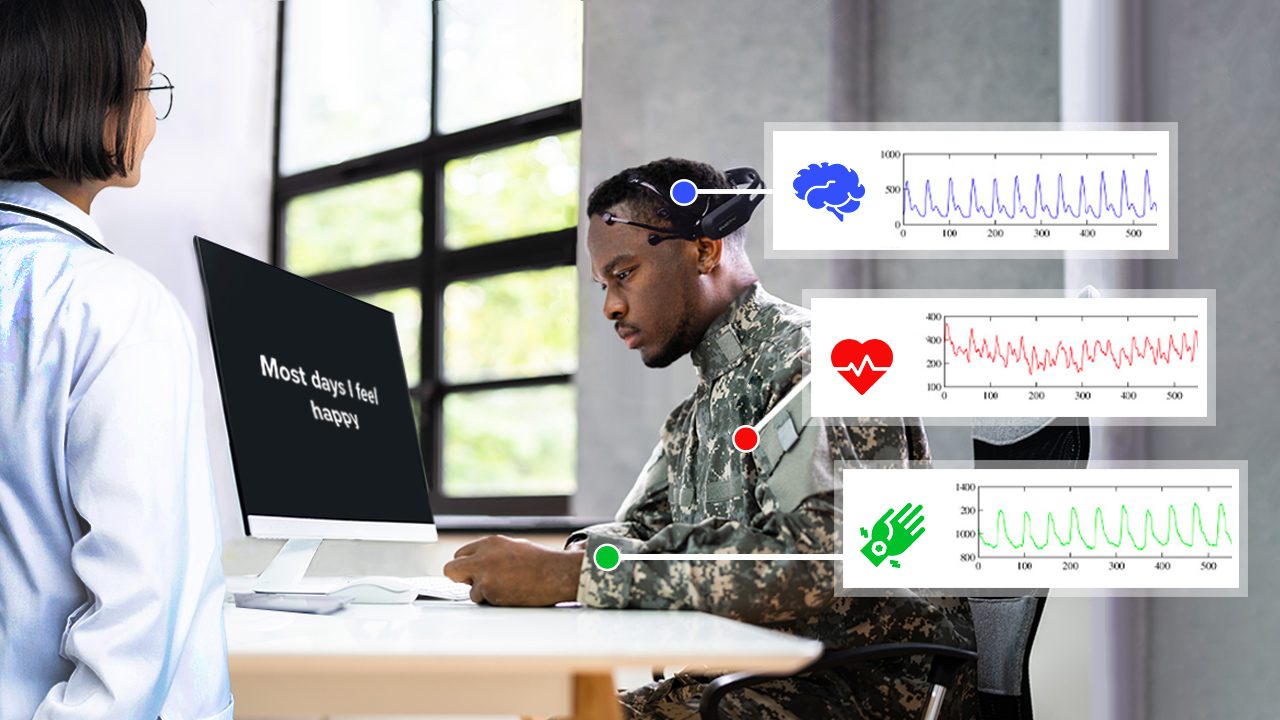Charles River Analytics is partnering with researchers from Tufts University, the Georgia Institute of Technology (GA Tech), and Emory University to develop techniques for conducting more objective psychological state assessments of warfighters and veterans.
The Preconscious Signal Compilation for Robust and Individualized Belief Evaluation (PRESCRIBE) project won a nearly $10.5M contract from the Defense Advanced Research Projects Agency (DARPA). PRESCRIBE more clearly identifies an individual’s proclivity to depression and suicidality by recording preconscious neuropsychological reactions to stimuli.
Current techniques to detect early signs of behavioral and mental health problems rely on screening questionnaires or self-reporting, but these are known to be of limited reliability due to the persistent societal stigma associated with mental illness and warfighters’ desire to not let their comrades down. To overcome this challenge, DARPA has developed the Neural Evidence Aggregation Tool (NEAT) to better pinpoint risks of mental illness using preconscious brain signals. PRESCRIBE is Charles River’s contribution to DARPA’s NEAT program.
For PRESCRIBE, brief vignettes will be created for people to read on a computer screen. The team hypothesizes that these stimuli will elicit very different responses from people who are depressed versus those who are not. Participants’ neurophysiological and psychophysiological reactivity to the stimuli will be assessed, including brainwaves, cardiovascular measures, and eye movements.
“PRESCRIBE hopes to collect data on multiple diverse cohorts to then build a model that can be applied to many populations and deployment settings,” says Dr. Bethany Bracken, Principal Scientist at Charles River Analytics and Co-Principal Investigator on the PRESCRIBE effort.
Phase 1 of PRESCRIBE targets diagnoses of depression or suicidality, while Phase 2 will likely add a cohort, potentially individuals with post-traumatic stress disorder (PTSD).
Charles River Analytics’ probabilistic programming framework, Scruff™, forms the foundation for PRESCRIBE. “We’re using Scruff because it lets us combine the different measurements that we’re going to make in a better way than conventional statistical analysis,” says Dr. Spencer Lynn, Senior Scientist at Charles River Analytics and Co-Principal Investigator on PRESCRIBE.
Because Scruff is based on probabilistic modeling, it can output a confidence rating in the model’s results. This gives clinicians using PRESCRIBE more information than a simple yes/no indicator so that they can best integrate information from the system with their other clinical tools.
In addition, Scruff allows PRESCRIBE to use fewer stimuli and takes less time than other assessment techniques. “Traditionally, you’d collect all the data on somebody and then analyze it, but we’re trying to build a model that can do that analysis while the data is being collected and that can come to a conclusion with less data,” Lynn says. DARPA’s goal for assessments is an hour or less.
PRESCRIBE methodology can extend to use cases beyond screening of warfighters and veterans. “The goal for PRESCRIBE is to be used in the clinic, integrating into the military’s standard yearly checkup of personnel,” Bracken says. “If we’re even partially successful, we could have a real impact on helping people who suffer from depression and potentially suicidality.”
Contact us to learn more about PRESCRIBE and our health and medical and probabilistic programming capabilities.
Related Articles
Teams Selected to Develop New Mental Health Screening Tool for Early Detection of Suicidality
New Cognitive Science Tool to Shed Light on Mental Health
This material is based upon work supported by the Naval Information Warfare Center Pacific (NIWC-Pacific) and Defense Advanced Research Projects Agency, Defense Sciences Office (DARPA-DSO) under Contract No. N66001-23-C-4002. Any opinions, findings and conclusions or recommendations expressed in this material are those of the author(s) and do not necessarily reflect the views of the NIWC-Pacific and DARPA-DSO.





